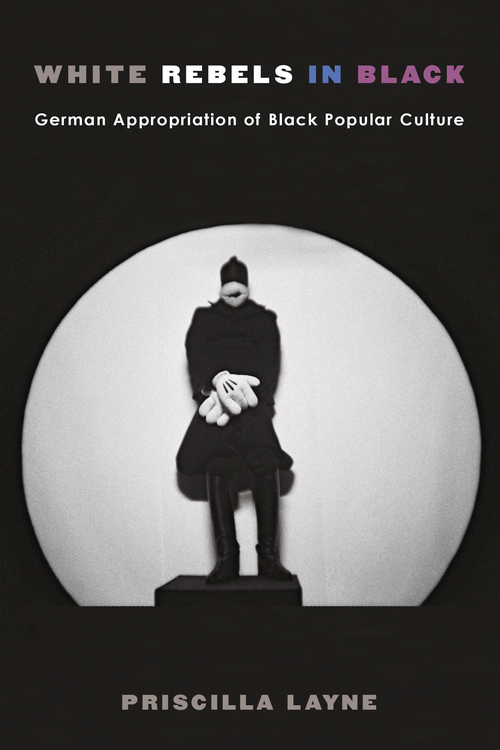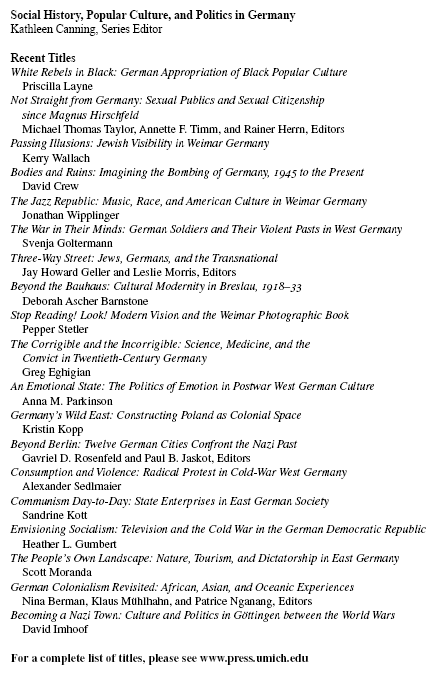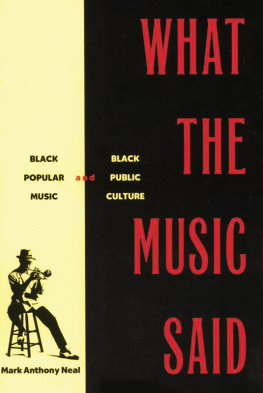
White Rebels in Black

White Rebels in Black
German Appropriation of Black Popular Culture
Priscilla Layne
University of Michigan Press
Ann Arbor
Copyright 2018 by Priscilla Layne
All rights reserved
This book may not be reproduced, in whole or in part, including illustrations, in any form (beyond that copying permitted by Sections 107 and 108 of the U.S. Copyright Law and except by reviewers for the public press), without written permission from the publisher.
Published in the United States of America by the
University of Michigan Press
Manufactured in the United States of America
A CIP catalog record for this book is available from the British Library.
Library of Congress Cataloging-in-Publication Data
Names: Layne, Priscilla, author.
Title: White rebels in Black : German appropriation of Black popular culture / Priscilla Layne. Description: Ann Arbor : University of Michigan Press, [2018] | Series: Social history, popular culture, and politics in Germany | Includes filmography. | Includes bibliographical references and index. | Identifiers: LCCN 2017053881 (print) | LCCN 2018004612 (ebook) | ISBN 9780472123834 (e-book) | ISBN 9780472130801 (hardcover : alk. paper)
Subjects: LCSH: German literature20th centuryHistory and criticism. | German literatureBlack authorsHistory and criticism. | Blacks in literature. | Masculinity in literature. | Blacks in popular cultureGermanyHistory20th century. | Motion picturesGermanyHistory20th century. | Blacks in motion pictures. | Masculinity in motion pictures. | BlacksRace identityGermany. | WhitesRace identityGermany.
Classification: LCC PT149.B55 (ebook) | LCC PT149.B55 L39 2018 (print) | DDC 830.9/896dc23
LC record available at https://lccn.loc.gov/2017053881
This book is dedicated to my son, Liam Herbert Layne-Kopf, and to my late maternal grandparents, Gloria Williams and Livingston Phillips.
Contents
It takes a village to raise a child. It also takes a village to transform a student into a scholar and bring a book from concept to publication. This book would not have been possible without a wealth of people who have supported me both professionally and personally.
First and foremost, Id like to acknowledge the two people for whom I have my existence to thank: my mother, Diana Lucinda Layne, and my father, Bancroft Earl Levy. My parents immigrated to the United States from Barbados and Jamaica respectively. If it werent for their own drive for success and their value of education, I wouldnt be where I am today. And they have continued to support me through adulthood, sometimes with financial support, often with emotional support or childcare. I experienced a lot of ups and downs during these past seven years, and if it were not for my parents love and support, this journey would have been a lot more difficult.
Second, Id like to thank my academic mother or Doktormutter, Deniz Gktrk. Deniz has been a mentor to me since my first days of graduate school at the University of California at Berkeley. She was often a tough critic, but that is exactly what I valued in our relationship. I knew she would not accept anything mediocre. And though it sometimes felt her suggestions sent me down a rabbit hole of references, in the end her recommendations were always valuable and Im glad I went down that rabbit hole. Deniz is definitely the person whose academic endeavors have been most influential in my professional life. And on a personal level, she is a cherished friend with whom I look forward to keeping in touch for many years to come. There were several other professors at Berkeley who were also influential, helpful, and supportive, especially the other two members of my dissertation committee: Tony Kaes and Jocelyne Guilbault. Also special thanks to another professor in the UC system, whom I was lucky to meet during her stay in North Carolina, Jane Newman. Finally, a special thanks to several people who made graduate school a lovelier experience: Kristin Dickinson, Robin Ellis, and my fellow cohort member and dear friend Melissa Etzler, who actually volunteered to proofread my dissertation free of charge so many years ago. Thanks also to Paul Dobryden for telling me about the film Ich ksse ihre Hand, Madame.
I am blessed to have not only been mentored by professors at my home institutions, but also by many people in the fields of German studies and African diaspora studies who luckily were willing to give me advice on my work and career. Several of those people are members of Women in German Studies, like Sara Lennox, Faye Stewart, and Hester Baer. Some of the mentors outside of German studies are Tina Campt and fellow Mellon Mays Fellows Michelle Wright and Kimberly Juanita Brown. And of course there are colleagues abroad who have been helpful as well, especially Sabine Broeck, Frauke Berndt, Lily Tonger-Erk, and Franziska Bergmann.
Since joining the faculty at the University of North Carolina at Chapel Hill, my group of friends and family has grown to include many wonderful colleagues. Some of the people in German studies in North Carolina who have aided me with career advice, feedback on my writing, and general life coaching are Inga Pollmann, Gabriel Trop, Ruth von Bernuth, Richard Langston, Jonathan Hess, Clayton Koelb, Ewa Wampuszyc, and Jakob Norberg. There are also many colleagues across campus in other departments who have been equally supportive, like Ariana Vigil, Michael Palm, Karla Slocum, Kia Caldwell, and Patricia Parker. And a special thanks to my fellow scholars of Black German studies, who have included me in their panels, shared book titles with me, given me emotional support and feedback on my work, and inspired me with their own awesome endeavors: Fatima El-Tayeb, Peggy Piesche, Michelle Eley, Jamele Watkins, Kira Thurman, Sonja Donaldson, Tiffany Florvil, Karina Griffith, Rosemarie Pena, and Vanessa Plumly.
Regarding this book in particular, a few years ago, several scholars attended a book manuscript workshop, for which they read an earlier draft of this book and generously gave me their time and feedback. Those people are Leslie Adelson, Katrin Sieg, Jonathan Wipplinger, Fitzhugh Brundage, Ann Marie Rassmussen, Adriane Lenz-Smith, and Jonathan Hess. Furthermore, this book would be nowhere as good as it is if not for the extensive feedback provided by Sara Lennox and Michelle Wright, whose suggestions for improvement were priceless, as well as the generous help of Sohini Sengupta at the Center for Faculty Excellence at UNC and Sonam Singh, my absolute favorite copy editor. I would also like to thank the staff at the University of Michigan Press, in particular LeAnn Fields, Christopher Dreyer, and series editor Dr. Kathleen Canning. And a special thanks to Philipp Khabo Kpsell, who is the one artist discussed in this book with whom Ive had personal contact. Philipp has been supportive of my work, both by agreeing to an interview several years ago and by giving me a free copy of the book Afro-shop. I am eternally grateful and I recognize how indebted I am to black German artists who are willing to take the time to speak with me. I hope this book brings well-deserved attention to the black German community, including its wealth of talented artists.
I want to thank all of the faculty and staff whom Ive met over the years, who are associated with the Mellon Mays Undergraduate Fellowship and the Moore Undergraduate Research Apprenticeship, including Elise LaRose, Josephine Moreno, Rosa Perelmutter, Charlene Regester, Kennetta Hammond Perry, Sandy Darity, and countless others whom I have not named individually. Programs like MMUF and MURAP help support young scholars of color like myself, who otherwise would feel totally lost and alienated in this world of academia. As you can see, I received a lot of help in my endeavors, and words really cannot express the gratitude I feel for all of these people and many more whom I could not name individually. I hope to give back to the academic community, my local community, and a global community of activists and scholars as a show of gratitude to all of these people who have made this book possible.
Next page










